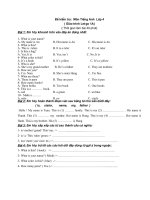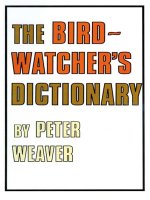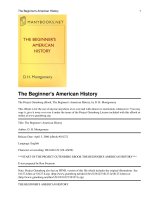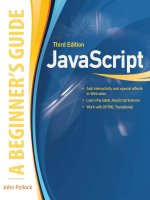spanish - english english - spanish beginner's dictionary
Bạn đang xem bản rút gọn của tài liệu. Xem và tải ngay bản đầy đủ của tài liệu tại đây (3.85 MB, 458 trang )
Lipton
and
Muñoz
SPANISH-ENGLISH/ENGLISH-SPANISH
BEGINNER’S DICTIONARY
SPANISH-ENGLISH/
ENGLISH-SPANISH
BEGINNER’S
DICTIONARY
FO URTH
ED ITION
FOUR TH EDITION
This illustrated bilingual dictionary is designed for
English-speaking students beginning to study Spanish
and Spanish-speaking students beginning to study
English. It presents approximately 1,400 words in
each language, each with translation, pronunciation,
and a sample sentence. A separate reference section
lists bilingual verb tenses, days of the week, months,
numbers, and other helpful words. Entries appear in
two sections: Spanish to English and English to Spanish.
New in this edition are bilingual culture notes and full
conjugations in the present tense of frequently
used verbs.
200 illustrations
ISBN-13: 978-0-7641-3968-0
EAN
$8.99 Canada $10.99
www.barronseduc.com
ISBN-10: 0-7641-3968-1
7-3968-Span-Eng-Dic-fbs:Layout 1 1/7/09 4:52 PM Page 1
By Gladys C. Lipton
Director
National FLES Institute,
Kensington, MD
Olivia Muñoz
Former Director of Foreign Languages
Board of Education, Houston Public Schools,
Houston, TX
SPANISH-ENGLISH/
ENGLISH-SPANISH
BEGINNER’S
DICTIONARY
FOURTH EDITION
7-3968 Span-FM 1/19/09 12:50 PM Page i
© Copyright 2009, 1998, 1989, 1975 by Barron’s Educational Series, Inc.
All rights reserved. No part of this publication may be reproduced or distributed in any
form or by any means without the written permission of the copyright owner.
All inquiries should be addressed to:
Barron’s Educational Series, Inc.
250 Wireless Boulevard
Hauppauge, NY 11788
www.barronseduc.com
ISBN-13: 978-0-7641-3968-0
ISBN-10: 0-7641-3968-1
Library of Congress Control Number 2008934846
Printed in China
9 8 7 6 5 4 3 2
Dedicated, with affection, to
Robert Lipton and Raúl Muñoz, Jr.
The authors wish to thank Eloise Rodríguez and
Elaine Wolfire for valuable suggestions, and Michael S. Pérez
for his great work on the final coordination of the material.
7-3968 Span-FM_7-3968 pi-vi 4/22/10 1:34 PM Page ii
Introduction iv
SPANISH-ENGLISH 1
A Note About Grammar 2
Spanish Pronunciation Key
(for English Speakers) 3
Spanish—English 7
Spanish Verb Supplement 199
INGLÉS-ESPAÑOL 203
English Pronunciation Key
(for Spanish Speakers) 204
Inglés—Español 207
English Verb Supplement 431
References
Days of the Week 435
Months of the Year 435
Personal Names 436
Numbers 1–100 438
Weights and Measures 442
Parts of Speech 442
For Travelers 443
Map 449
Introducción v
ESPAÑOL-INGLÉS 1
Una Nota Sobre Gramática 2
Clave de Pronunciación del
Español (para Anglohablantes) 3
Español—Inglés 7
Suplemento de Verbos en
Español 199
ENGLISH-SPANISH 203
Clave de Pronunciación del Inglés
(para Hispanohablantes) 204
English—Spanish 207
Suplemento de Verbos en
Inglés 431
Referencias
Los Días de la Semana 435
Los Meses del Año 435
Los Nombres 436
Números 1–100 438
Pesos y Medidas 442
Partes de la Oración 442
Para los Viajeros 443
Mapa 449
Table of Tabla de
Contents Materias
7-3968 Span-FM 1/19/09 12:50 PM Page iii
ebooksdownloadrace.blogspot.in
Introduction
Learning another language can be fun for everybody! This
Spanish–English/English–Spanish Beginner’s Dictionary
is a book that will be both interesting and useful to you. If
you enjoy discovering new words and sentences in Spanish
and English, if you like trying to pronounce new sounds and
looking at pictures, this book will bring many hours of
enjoyment.
This fourth edition contains many new and expanded fea-
tures, including new words and expressions, particularly in
technology. There are many Cultural Notes scattered
throughout the book, reflecting both Spanish and American
cultures. There is also a For Travelers supplement to assist
you when you travel to the many Spanish-speaking coun-
tries around the world. And the Spanish and English pro-
nunciation keys will help you solve some of the mysteries of
foreign language pronunciation.
Last, but not least, by looking up words and expressions in
both languages, you will have an opportunity to compare
them and gain some insights into Spanish and American
cultures.
Welcome to the world of languages!
Gladys C. Lipton and Olivia Muñoz
iv
7-3968 Span-FM 1/19/09 12:50 PM Page iv
v
Aprender una lengua extranjera puede ser divertido para
todo el mundo. Pronto verás que este diccionario bilingüe es
interesante y muy útil. Si tú gozas descubriendo nuevas
palabras y frases en español e inglés, si te gusta tratar de
pronunciar nuevos sonidos y mirar ilustraciones, este libro
te dará muchas horas de agradable pasatiempo.
La cuarta edición contiene muchas palabras y expresiones
nuevas, especialmente en el campo de la tecnología. Hay
muchas Notas Culturales repartidas en el texto que reflejan
tanto la cultura hispana como la norteamericana. Hemos
también incluido un Suplemento para Viajeros para
ayudarte cuando viajes a distintos países de habla inglesa. Y
las claves de pronunciación del español y del inglés te
aclararán o resolverán el misterio de cómo decir las
palabras correctamente.
Por último, cuando busques palabras y expresiones en
ambos idiomas, tendrás la oportunidad de compararlos y así
comprender mejor las culturas hispana y norteamericana.
¡Bienvenido al mundo de los idiomas!
Gladys C. Lipton y Olivia Muñoz
Introducción
7-3968 Span-FM 1/19/09 12:50 PM Page v
7-3968 Span-FM 1/19/09 12:50 PM Page vi
Spanish-English
(Español-Inglés)
7-3968 Span-EngText 1/14/09 10:08 AM Page 1
A Note About Grammar
The “vosotros” form is included in parentheses within all
verbal conjugations. Please be aware that this form is nor-
mally used in Spain, but it is of very limited use in Latin
American countries.
Una Nota Sobre Gramática
La forma del “vosotros” se ha incluido en paréntesis dentro
de todas las conjugaciones verbales. Cabe notar que esta
forma es de uso corriente en España, pero se emplea muy
infrecuentemente en los países latinoamericanos.
2
7-3968 Span-EngText 1/14/09 10:08 AM Page 2
Spanish Pronunciation Key
(for English speakers)
Notes
Many Spanish sounds do not have an exact English
equivalent. The phonemic symbols are approximate and
will assist the beginning student of Spanish as he or she
encounters new words and phrases.
The Spanish–American pronunciation is used through-
out the dictionary.
Capital letters in the phonemic symbols indicate the
syllable that receives the emphasis. For example,
den-
TEES-ta
Beginning students of Spanish should be particularly
careful of the pronunciation of Spanish vowels. Spanish
vowels are sharper, clearer, and less drawn out than English
vowels.
In order to give the student greater confidence, some of
the refinements of Spanish pronunciation have not been
indicated, such as intervocalic “d.” These will be easily
acquired with further study and listening to spoken Spanish.
5.
4.
3.
2.
1.
3
7-3968 Span-EngText 1/14/09 10:08 AM Page 3
4
CONSONANTS
Spanish Spelling Phonemic Symbol
b, v b
c + a, o, u k (as in kitten)
c + e, i s (as in sit)
ch ch
dd
ff
g + a, o, u g (as in go)
g + e, i j (like the h in house)
gu + e, i g (as in go)
h (silent) —
j j (like the h in house)
kk
ll
ll ly (as in million)
(or y for pronunciation in
Southwestern U.S. and most
of western hemisphere)
mm
nn
ñ ny (as in onion)
pp
qu k
rr
rr rr (strong rolling sound)
ss
tt
vb
x ks, gs
y y (as in yellow)
zs
7-3968 Span-EngText 1/14/09 10:08 AM Page 4
5
VOWELS
Spanish Spanish Phonemic Sounds something
Spelling Example Symbol like English word
a la a father
e pero e pet
i, y disco ee keep
io serio eeo —
o oficina o open
u útil u too
ie cierto ye yesterday
ey, ue, ei seis ay say
ai bailar aee fight
au causa av how
7-3968 Span-EngText 1/14/09 10:08 AM Page 5
7-3968 Span-EngText 1/14/09 10:08 AM Page 6
A
a [A] preposition at, in, to
Ellos van a México.
They are going to Mexico.
a la derecha
[a-la-de-RE-cha] preposition to the right
El auto dobla a la derecha.
The car turns to the right.
a la izquierda
[a-la-is-KYER-da] preposition to the left
Enrique se sienta a la izquierda de Carlos.
Henry sits to the left of Charles.
el abanico
[a-ba-NEE-co] noun, masc. fan
Usa el abanico porque hace calor.
She uses the fan because it’s hot.
la abeja
[a-BE-ja] noun, fem. bee
A la abeja le gustan las flores.
The bee likes flowers.
abierto
[a-BYER-to] adjective, masc. open
abierta [a-BYER-ta] fem.
La caja está abierta.
The box is open.
el abogado
[a-bo-GA-do] noun, masc. lawyer, attorney
Mi papá es abogado.
My father is a lawyer.
abril
[A-BREEL] noun, masc. April
En abril llueve mucho.
It rains a lot in April.
a abril
7
7-3968 Span-EngText 1/14/09 10:08 AM Page 7
abrir [a-BREER] verb to open
Yo abro Nosotros abrimos
Tú abres (Vosotros abrís)
Él, Ella, Usted abre Ellos, Ellas, Ustedes abren
Marcos abre la puerta.
Mark opens the door.
la abuela
[a-BUE-la] noun, fem. grandmother
La abuela prepara la comida.
The grandmother prepares the food.
el abuelo
[a-BUE-lo] noun, masc. grandfather
Mi abuelo va a la pesca.
My grandfather goes fishing.
acabar
[a-ka-BAR] verb to finish
Yo acabo Nosotros acabamos
Tú acabas (Vosotros acabáis)
Él, Ella, Usted acaba Ellos, Ellas, Ustedes acaban
Alejandra siempre acaba la tarea temprano.
Alexandra always finishes the homework early.
acabar de
[a-ka-BAR-de] idiomatic expression to have just
Yo acabo Nosotros acabamos
Tú acabas (Vosotros acabáis)
Él, Ella, Usted acaba Ellos, Ellas, Ustedes acaban
Él acaba de tomar un refresco.
He just had a drink.
el aceite
[a-SAY-te] noun, masc. oil
El motor necesita aceite.
The motor needs oil.
abrir el aceite
8
7-3968 Span-EngText 1/14/09 10:08 AM Page 8
la acera [a-SE-ra] noun, fem. sidewalk
Ellos caminan por la acera.
They walk along the sidewalk.
acompañar
[a-com-pa-NYAR] verb to go along,
to accompany
Yo acompaño Nosotros acompañamos
Tú acompañas (Vosotros acompañáis)
Él, Ella, Usted acompaña Ellos, Ellas, Ustedes acompañan
El muchacho acompaña a su hermana.
The boy accompanies his sister.
acostarse
[a-kos-TAR-se] verb to go to bed
Yo me acuesto Nosotros nos acostamos
Tú te acuestas (Vosotros os acostáis)
Él, Ella, Usted se acuesta Ellos, Ellas, Ustedes se acuestan
Los niños se acuestan a las nueve.
The children go to bed at nine.
el actor
[ak-TOR] noun, masc. actor
El actor está aquí.
The actor is here.
el acuario [a-KUA-reeo] noun, masc. aquarium
Hay peces en el acuario.
There are fish in the aquarium.
adiós
[a-DEEOS] interjection good-bye
El papá dice “adiós.”
The father says “Good-bye.”
la acera adiós
9
7-3968 Span-EngText 1/14/09 10:08 AM Page 9
adivinar [a-dee-bee-NAR] verb to guess
Yo adivino Nosotros adivinamos
Tú adivinas (Vosotros adivináis)
Él, Ella, Usted adivina Ellos, Ellas, Ustedes adivinan
Adivina lo que traigo.
Guess what I have.
adrede
[a-DRE-de] adverb on purpose
El niño rompe el vaso adrede.
The boy breaks the glass on purpose.
la aeromoza
[ae-ro-MO-sa] noun, fem. flight attendant
La aeromoza ayuda a los pasajeros.
The flight attendant helps the passengers.
el aeropuerto
[ae-ro-PUER-to] noun, masc. airport
El avión sale del aeropuerto.
The plane leaves the airport.
afuera
[a-FUE-ra] adverb outside
El jardín está afuera.
The garden is outside.
agarrar
[a-ga-RRAR] verb to catch, to get
Yo agarro Nosotros agarramos
Tú agarras (Vosotros agarráis)
Él, Ella, Usted agarra Ellos, Ellas, Ustedes agarran
Yo también quiero agarrar un pollito.
I also want to catch a chick.
adivinar agarrar
10
7-3968 Span-EngText 1/14/09 10:08 AM Page 10
agosto [a-GOS-to] noun, masc. August
Su cumpleaños es en agosto.
Her birthday is in August.
agradable
[a-gra-DA-ble] adjective pleasant, nice
Mi maestra es agradable.
My teacher is nice.
agua
[A-gua] noun, fem. water
Tengo sed. Dame agua, por favor.
I’m thirsty. Give me some water, please.
la aguja
[a-GU-ja] noun, fem. needle
La señora usa la aguja para coser.
The lady uses the needle to sew.
ahora
[a-O-ra] adverb now
Ahora no podemos ir.
We can’t go now.
ahorrar
[a-o-RRAR] verb to save
Yo ahorro Nosotros ahorramos
Tú ahorras (Vosotros ahorráis)
Él, Ella, Usted ahorra Ellos, Ellas, Ustedes ahorran
Lino ahorra su dinero.
Linus saves his money.
el aire
[AEE-re] noun, masc. air
Ellos abren la ventana para que entre aire fresco.
They open the window so the cool air can come in.
agosto el aire
11
7-3968 Span-EngText 1/14/09 10:08 AM Page 11
el ala [A-la] noun, fem. wing
las alas [A-las]
El pájaro usa las alas para volar.
The bird uses his wings to fly.
la alberca
[al-BER-ka] noun, fem. pool
Roberto nada en la alberca. (la piscina)
Robert swims in the pool.
la alcancía
[al-kan-SEE-a] noun, fem. (piggy) bank
Eloísa guarda el dinero en su alcancía.
Eloise keeps the money in her bank.
alegre [a-LE-gre] adjective cheerful, gay, glad
Hoy los niños están alegres.
The children are cheerful today.
In the year 711, the Moors invaded Spain and
remained there for eight centuries. Although
forced to leave, they left their mark on Spanish
history and language. Among the words of Arabic
origin that came into the Spanish language are
alcancía (savings), almohada (pillow), alcohol, and
álgebra. Other examples are naranja (orange),
toronja (grapefruit), and limón (lemon).
En el año 711 los moros invadieron a España y allí
permanecieron durante ocho siglos. Aunque
forzados a salir, dejaron sus huellas en la histroria
y en la lengua española. Entre las palabras árabes
que entraron en la lengua están alcancía,
almohada, alcohol, y álgebra. Otros ejemplos
son naranja, toronja, y limón.
el ala alegre
12
7-3968 Span-EngText 1/14/09 10:08 AM Page 12
la alfombra [al-FOM-bra] noun, fem. rug
La alfombra de la sala es hermosa.
The rug in the living room is beautiful.
algo
[AL-go] pronoun, masc. something
Hay algo en la caja.
There is something in the box.
el algodón
[al-go-DON] noun, masc. cotton
El vestido es de algodón.
The dress is made of cotton.
alguien
[AL-gyen] pronoun someone
Alguien está en la puerta.
Someone is at the door.
algunas veces
[al-GU-nas-BE-ses] adverb sometimes
Algunas veces vamos al parque zoológico.
Sometimes we go to the zoo.
la almohada
[al-mo-A-da] noun, fem. pillow
Duermo en una almohada suave.
I sleep on a soft pillow.
la alfombra la almohada
13
7-3968 Span-EngText 1/14/09 10:08 AM Page 13
alrededor [al-rre-de-DOR] adverb around
El jardín está alrededor de la casa.
The garden is around the house.
el alumno
[a-LUM-no] noun, masc. pupil
la alumna
[a-LUM-na] fem.
El alumno hace la lección en clase.
The pupil does his lesson in class.
allá
[a-LYA, a-YA] adverb down there, over there
Allá está el avión.
The plane is over there.
allí
[a-LYEE, a-YEE] adverb there
Tu libro está allí.
Your book is there.
amar
[a-MAR] verb to love
Yo amo Nosotros amamos
Tú amas (Vosotros amáis)
Él, Ella, Usted ama Ellos, Ellas, Ustedes aman
Mi mamá ama a mi papá.
My mom loves my dad.
la ambulancia
[am-bu-LAN-seea] noun, fem. ambulance
La ambulancia va al hospital.
The ambulance is going to the hospital.
americano
[a-me-ree-KA-no] adjective, masc. American
americana
[a-me-ree-KA-na] fem.
Mi maestro es americano de los Estados Unidos.
My teacher is an American from the United States.
alrededor americano
14
7-3968 Span-EngText 1/14/09 10:08 AM Page 14
el amigo [a-MEE-go] noun, masc. friend, chum
la amiga
[a-MEE-ga] fem.
Los amigos están pescando.
The friends are fishing.
anaranjado
[a-na-ran-JA-do] adjective, masc. orange
anaranjada
[a-na-ran-JA-da] fem.
color de naranja
[ko-LOR-de-na-RAN-ja]
Su camisa es anaranjada.
His shirt is orange.
ancho
[AN-cho] adjective, masc. wide
ancha
[AN-cha] fem.
La calle es muy ancha.
The street is very wide.
andar
[an-DAR] verb to go, to walk
Yo ando Nosotros andamos
Tú andas (Vosotros andáis)
Él, Ella, Usted anda Ellos, Ellas, Ustedes andan
Ellos andan en el parque.
They are walking in the park.
el amigo andar
15
7-3968 Span-EngText 1/14/09 10:08 AM Page 15
andar a caballo idiomatic expression to go horseback
[an-DAR-a-ka-BA-yo] riding
Cada domingo anda a caballo.
Every Sunday he goes horseback riding.
andar en bicicleta, montar en bicicleta to go bicycle
[an-DAR-(mon-TAR)-en-bee-see-KLE-ta] riding
Le gusta montar en bicicleta.
She likes to go bicycle riding.
el anillo
[a-NEE-lyo, a-NEE-yo] noun, masc. ring
¡Qué anillo tan bonito!
What a beautiful ring!
el aniversario
[a-nee-ber-SA-reeo] noun, masc. anniversary
Mis padres celebran su aniversario.
My parents are celebrating their anniversary.
la antena de televisión television antenna
[an-TE-na-de-te-le-bee-SEEON] noun, fem.
Las casas tienen antenas de televisión.
The houses have television antennas.
antes
[AN-tes] preposition before
Antes de mirar la televisión, hay que hacer las tareas.
Before watching television, we have to do our homework.
el año
[A-nyo] noun, masc. year
Roberto tiene quince años.
Robert is fifteen years old.
apagar
[a-pa-GAR] verb to turn off
Yo apago Nosotros apagamos
Tú apagas Vosotros apagáis
Él, Ella, Usted apaga Ellos, Ellas, Ustedes apagan
el anillo apagar
16
7-3968 Span-EngText 1/14/09 10:08 AM Page 16
El papá apaga la luz.
The father turns off the light.
el aparador
[a-pa-ra-DOR] noun, masc. store window
Hay ropa en el aparador. (la vitrina)
There are clothes in the store window.
el aparato de televisión television set
[a-pa-RA-to-de-te-le-bee-SEEON] noun, masc.
El aparato de televisión es moderno.
The television set is modern.
el apartamento
[a-par-ta-MEN-to] noun, masc. apartment
Ellos viven en un apartamento cerca de la escuela.
They live in an apartment near the school.
el apellido
[a-pe-LYEE-do] noun, masc. family surname
¿Cuál es su apellido?
What is your family surname?
In Spain and Latin America, people officially
identify themselves by using both the father’s last
name and the mother’s maiden name. If my name
is José Luis, my full name would be JOSÉ LUIS
GARCÍA OBREGÓN. García is my father’s family
name and Obregón is my mother’s family name.
En España y Latinoamérica, la gente se identifica
oficialmente con el apellido de cada uno de los
padres. Es decir, si me llamo JOSÉ LUIS, mi
nombre completo es JOSÉ LUIS GARCÍA
OBREGÓN. García es el apellido de mi padre y
Obregón es el apellido de mi madre.
el aparador el apellido
17
7-3968 Span-EngText 1/14/09 10:08 AM Page 17
el apetito [a-pe-TEE-to] noun, masc. appetite
Mi hermano come con buen apetito.
My brother has a good appetite.
el apio
[A-peeo] noun, masc. celery
Me gusta el apio en la ensalada.
I like celery in the salad.
aprender
[a-pren-DER] verb to learn
Yo aprendo Nosotros aprendemos
Tú aprendes (Vosotros aprendéis)
Él, Ella, Usted aprende Ellos, Ellas, Ustedes aprenden
Se va a la escuela a aprender.
One goes to school to learn.
apretado
[a-pre-TA-do] adjective, masc. tight
apretada
[a-pre-TA-da] fem.
El saco está apretado.
The coat (jacket) is tight.
aquí
[a-KEE] adverb here
Aquí están los zapatos.
The shoes are here.
aquí tiene idiomatic expression here is, are
Aquí tiene usted su paquete.
Here is your package.
el apetito aquí
18
7-3968 Span-EngText 1/14/09 10:08 AM Page 18









